#cable chain stitch
Explore tagged Tumblr posts
Video
youtube
How to do Cable Chain Stitch
3 notes
·
View notes
Text





My Coworker’s Mom’s blanket is complete!
My squares are, from top to bottom: 4th on row 1, 2nd, 3rd, & 4th on row 2, 1st & 2nd on row 4, and 1st & 2nd on row 5. All the rest are CMom’s. When choosing the squares I’d do, I picked a mix of graphic ones (the trees), cables, openwork/lace and textured patterns, to go with the ones CMom made.
Once all my squares were done, I made sure all 20 had crocheted borders with the same number of stitches per side and then crocheted them all together. Finally, I put on one of my favorite blanket borders: one wrong-side row of half-double crochet (so the ‘extra’ bar of the stitches ends up on the right-side), and one right-side row of {backward single crochet+chain two+skip one} repeated. I love borders with backward crochet stitches; I think they make things look so ‘finished’ on the edges.
So, hopefully there will be a day soon when Coworker and I are at the office at the same time (rare) so I can show her these photos and set up when I can give this to her. <3 I really enjoyed completing her Mom’s final creation and I hope she’ll think I did it justice!
Thanks to everybody on my original post about this who encouraged me and sent kind messages. I didn’t expect this to attract attention like it has and I’ve had fun reading other people’s similar stories. As I said in the reblog chains on that post, crafting really brings people together! So hey, all you knitters, crocheters, and other assorted fiber-craft creators—hope you’re having a great time with your projects!
2K notes
·
View notes
Text




The chain cable sweater is done! It is indeed intended to be a crop top, by request of the recipient. The yarn is 100% alpaca so it's super soft and cuddly.
The chain cable came from this video tutorial. There's no written pattern, so here's the instructions I transcribed (just for the cable, not for the sweater itself). It's a bit fiddly and you need to be careful about row counting, but it came out looking so good!
Chain cable
9 stitches across
Knit right side/purl wrong side for nine rows
Chain (RS):
K 6, turn, (slip 1, p 2, turn, slip 1, k 2, turn) x 2, slip 1, p 2, turn
Transfer 3 stitches to cable needle and hold in front
Put next three stitches on cable needle also and hold in front
Transfer 3 stitches from right needle to left needle
Knit last three stitches from cable needle
Knit first three stitches (with short rows) from cable needle
Knit 3
48 notes
·
View notes
Text
I wrote warriors angst, and I also gave him siblings and some ~trauma~
I hope you like it!
14 notes
·
View notes
Text
National Crochet Month
I am so behind on the fact that it is national crochet month! So here's a speed run of the first few days. And if you'd like me to expand some more on anything, my ask box is a open!
1. Meet the Maker -*waves* Gavii. Mostly crochet doilies but multistitchin with a current focus on blankets. 3 dogs. FFXIV. Thunderbirds.
2. WIP -I have four: a pair of socks, my long term temp blanket for the year, my FFXIV inspired blanket, and a quick market bag that just needs some straps added
3. Favorite Stitch - I'm rather partial to the HDC for its versatility with three loops
4. Something I'd like to try - Next on my to learn list is knit cables. I'd love to make a cabled hat. For crochet, I'm interested in trying mosaic or tapestry.
5. Being Silly - ? No, thank you?
6. Full of color - Hedgehog Fibres -
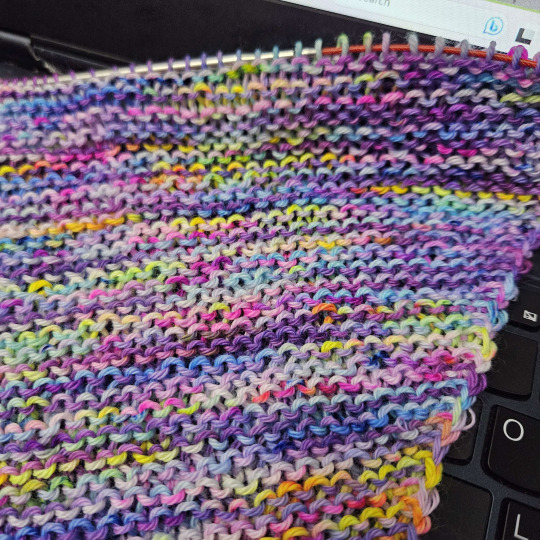
7. Stash - I don't want to talk about it. Here's some Happy Place instead
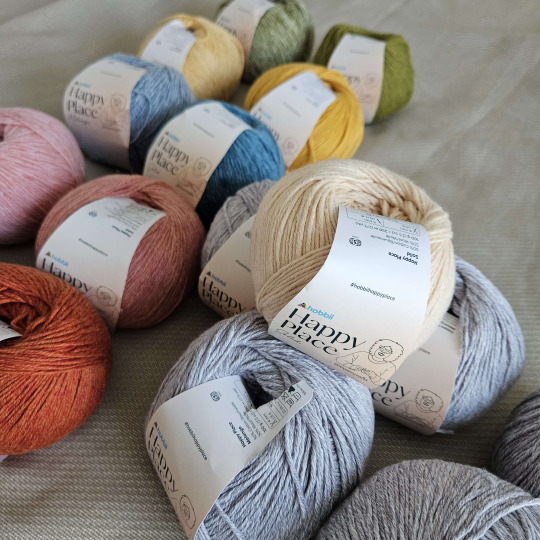
8. Crochet controversy - magic circle or chain start - like most things, it depends. I'll do magic circle to start doilies, especially if it's asking for sc. But for larger yarn weights and things like grannies, I prefer chain start because it feels more secure.
9. How I learned - I started on granny squares and my mom taught me - the rest I learned from reading patterns, trial and error, and watching youtube
10. Throwback Thursday This was a wedding gift I made a few years back
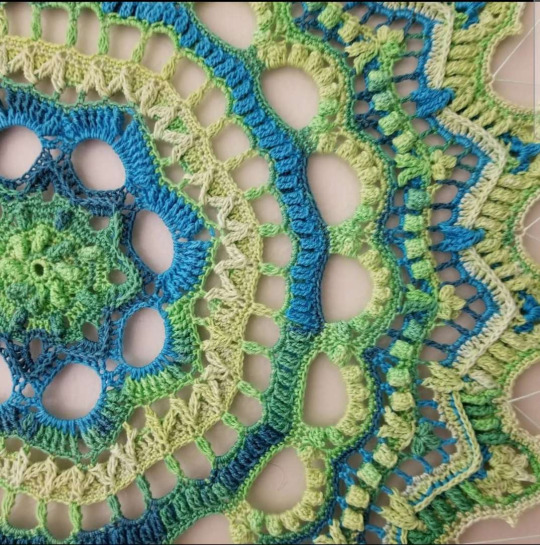
11. Texture - yes. I am a big fan of front post stitches, and like in the above, I adore when mandalas or doilies are designed with complexity.
15 notes
·
View notes
Photo
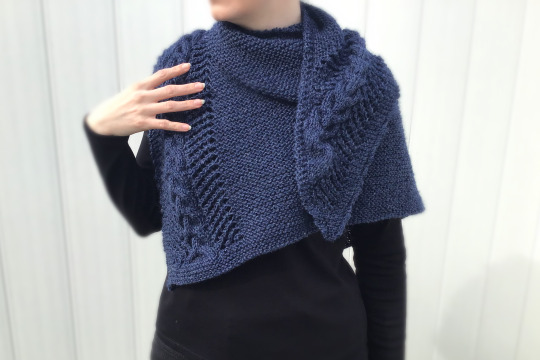

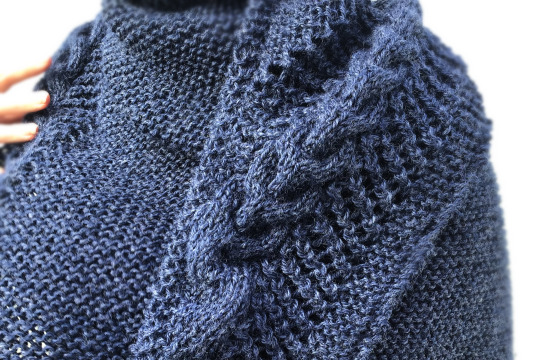
Chains and Lattice cable knit shawl -- here on Etsy!
Cable knit shawl or wrap, featuring a pattern of lacey lattice and a band of interlocking chain-like cables. The garter stitch body of the shawl is light and fluffy soft!
49 notes
·
View notes
Text
First time attempting to crochet a winged cable stitch. I start with a base chain of 36. Row of single crochets. Then the row with the cables. I get to the end and I have three 'leftover' stitches instead of two. I count. Yeah thats somehow 37. Throw in a decrease and finish the row. Next row of single crochets, counting as I go, now there are 35.
Sometimes in general Im off by one, and I thought it was that I was doing the starting slip stitch wrong, but I followed this person exactly. This tutorial btw by B.Hooked https://www.youtube.com/watch?v=N2Vn5gyiQqg
I just recounted my starting chain and theres 36.
Any idea what the heck is going on? Do I throw in an increase and play hide and seek with this moving stitch? Actually I dont have enough of this yarn for another row but I might have the same in a different colour.
Will add a photo in a sec.
Tadaaah
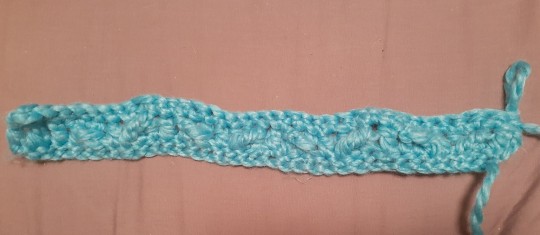
3 notes
·
View notes
Text
Crafting predictions for 2024
Out
Using stitch markers
The color blue
Knitting from written instructions
Crocheting from charts
Decorating cakes with drips
Making socks
Guessing gauge
Chenille blanket yarn
Yarn shaming
In
Reversible cables
Basketry
Knitting from charts
Crocheting from written instructions
Heathered yarn
Making tabi socks
Aggressive blocking
Handmade shoelaces (just chain stitch)
Fun fur
6 notes
·
View notes
Text
Neurodivergent Knitting: Casting On
Let’s face it, casting on is one of the hardest parts of knitting to learn, and sometimes one of the hardest to implement. Here are four of the most common methods and their pros/cons for the disabled and/or neurodivergent knitter.
Simple Cast On (single twist)
The easiest to execute, but one of the hardest to work stitches out of, especially if you have hand disabilities. It is a very stable casting technique, good for items you don’t want stretchy edges on or for items you want to puff in the middle. It uses no extra yarn, so you don’t need more than a couple of inches of tail (that way you actually have something you can weave to hide it later). Where it gets tough is that it has no gauge regulation of its own--the tightness of each stitch is 100% controlled by the knitter, so the tiniest moment of carelessness can pull a stitch too tight to get a second needle into it to work it. All you have to do to execute the simple cast on is to place a slipknot on your right needle, take your live yarn (the end connected to the skein/ball), give it a single clockwise twist so that it makes a closed loop, slide the loop onto the needle, and pull fairly tight--the tightness here has a big influence on the gauge of the bottom border, and if you make it too loose you may find it difficult to get any kind of uniformity going. When you look at your needle, it should look very similar to a sewing blanket stitch--vertical bars spaced out with yarn traveling horizontally between them, and the horizontal part should look kind of like it’s weaving in and out, in this case over the stitch it came from and under the stitch it’s going into.
Super Stretchy Cast On (double twist)
This one shares many of the same characteristics as the single twist cast on, both the positive and the negative, with one HUGE difference: this cast on will give you stretch instead of stability. The amount of stretch is variable, and tends to adjust itself based on what you work out of it on the first few rows of the work. It’s ideal for a rib or cable pattern with no bottom border, including top-down socks and gloves, cowls, hats, or limb-warmers. The stretchy cast on is most easily executed by placing a slipknot on the working needle, taking the live yarn, making a loop/twist like before, then twisting it one more time before sliding it onto the needle. The biggest challenge when using this cast on is that if you do not slide the stitches close together and pull up all their slack, they become irregular in size later. As a result, your first row working into them will be tight, just like with the simple cast on.
Crochet Cast On (picking up stitches)
This is probably the second-easiest to execute. Nothing fancy here, just make a slipknot, chain however many stitches you want to cast on. Then you get your knitting needle and pick up the back bar of each chain stitch (I say back bar because it makes what crocheters call a ‘neat edge’ at the bottom, but you can pick up the front top if that’s easiest for you). It is a very stable edge, but has a bit more give to it than the simple cast on, and makes a somewhat ornamental, very visible bottom edge. This cast on is the gentlest, sensory-wise, as you have no extra yarn touching you and there is little risk of the stitch getting too tight to work.
Long Tail Cast On (two-strand cast on)
Personally, I hate long tail. If you don’t judge the length of your tail correctly, you’ll either run out before you’ve cast the right length or you’ve got all that wasted yarn. I’m so, so bad at estimating that kind of length. That being said, it is extremely easy to work into, and is the foundation of most provisional/invisible cast on techniques (which allow you to make live-stitch borders that allow you to work both up and down from the same edge with no seam, very handy for fancy borders). To execute the long-tail cast on, first acknowledge that you’re probably going to estimate your tail length wrong and be ready to sacrifice a few inches of yarn (I’ve been told that the simplest way to estimate is to get two to three times as much length as the width of your work, depending on the size of needle, but let me tell ya, this definitely doesn’t always work for me...). It’s like cooking pasta or making buttercream frosting: size up the project, estimate the amount you think you’ll need, you are wrong. Now that you’ve come to terms with the loss and reminded yourself that it’s not your fault and you’re going to trust the process...twist the yarn around the needle so that you have the dead yarn (the tail end) crossing over the top of the live yarn (the skein end). With my mobility issues, I’ve found it easiest to hold my live yarn like I always do (behind the index, in front of middle and ring fingers, behind the pinky; sometimes, if the yarn feels like it’s getting away from me, I’ll slow it down by looping around my pinky once) and hold my dead yarn looped around my thumb and using my ring finger or pinky to catch up fresh loops. It’s difficult to execute this cast on if you hold the two ends in different hands, but it is possible if you don’t have enough control in your yarn hand--in that case, hold the dead yarn to the left (the ‘bottom’ of the cast edge) and the live yarn to the right (the ‘top’ of the cast edge); this is also the easy way for knitters who hold their yarn English style. Okay! All that complicated stuff is out of the way. Now is where it gets extremely simple: You’re going to make a single twist on the dead yarn (as if you were casting it onto the needle; as I mentioned, I like to keep this loop ready on my thumb, as if my thumb were my left needle), insert your needle knitwise and use your live yarn to knit a stitch onto your needle while dropping the twisted loop from your thumb and tugging the slack tight. That’s it. That’s all it is. Just using loops on a tail to knit through. You can even use scrap yarn from the same skein or dye lot and have your tail be a totally separate piece. You can use a contrasting yarn for the tail and then come through and add a border by using that contrasting yarn to find where to pick up stitches, after which you can just remove the contrasting yarn (this is called a provisional or temporary cast on, and it’s the easiest way to leave live stitches for a decorative edge). Sensory-wise, since you have two distinct strands of yarn doing two different tasks, this method is kind of icky; for me, I spend the whole time mentally chanting ‘nope’ while I remember that I have Big Plans™ for a fancy edge.
#actually disabled#yarncraft#actually neurodivergent#yarncraft for neurodivergents#neurodivergence#stimming
3 notes
·
View notes
Text
Portable two thread stitch sewing bag closing machine
Portable two thread stitch sewing bag closing machine Portable two thread chain stitch bag closing machine with direct drive by fan-cooled electric motor.
Combined upper and lower feed for greater power grips both sides of the bag, even on difficult materials.
Motor housing and handle made of fiber-glass reinforced break-resistant polyamide. Sealed, dust proof and permanently lubricated motor ball bearings. Power cable 5 m long.
Thank you for allowing Accurate Weighing Scales (U) Ltd the privilege to serve you in advance. For inquiries on deliveries contact us
Office +256 (0) 705 577 823, +256 (0) 775 259 917
Address: Wandegeya KCCA Market South Wing, 2nd Floor Room SSF 036
Email: [email protected]

#Crane (hanging) scales#Whole sale scales#Baby scales#Mini palm scales#Industrial platforms#assorted weighing brands including Avery#Salter#Health ( height and weight ) scales#Precision scales Analytical/Laboratory scales#Moisture meters#Temperature gauges#Pallet trolleys#kitchen scales#Animal scales#Bag closers-stitching machine#Plastic bag sealers#Plastic foot sealers#Batch sealers#Table top scales#Counter scales#Barcode readers/printer#Waterproof scales#Axle weigh bridge#Mini and full Weigh bridges among others.
0 notes
Text
lightweight handheld electric bag closer sewing machine
Portable two thread chain stitch bag closing machine with direct drive by fan-cooled electric motor. Combined upper and lower feed for greater power grips both sides of the bag, even on difficult materials. Motor housing and handle made of fiber-glass reinforced break-resistant polyamide. Sealed, dust proof and permanently lubricated motor ball bearings. Power cable 5 m long.

0 notes
Text
Crocheting vs. Knitting: Which Takes More Time?

When you think about yarn crafts, knitting and crocheting often spark a debate on which technique is faster. People of all ages enjoy both methods because of the meditative and relaxing benefits. Although yarn is used in both crafts, the approach, tools, and outcomes vary. Beginners and enthusiasts are concerned about which is more time-consuming. However, it mostly depends on the project type, and the thickness of the yarn for crochet or knitting projects, patterns, and tools. In this blog, let's go through in detail, and find out which techniques take more time.
Crochet or Knitting: What is time-consuming?
When you think about the two crafts; usually the difference comes down to the stitch type each craft produces, and the basic technique required to finish those stitches. Experienced knitters or crocheters will be able to complete the project more quickly than beginners. Additionally, crocheting has the upper hand over knitting in terms of speed. But, there are few things you need to know.
1. Stitch Speed and Structure
Many items are completed more quickly with crochet because it uses larger and fewer stitches. For instance, basic crochet stitches like single or double crochet can be used to finish a scarf made with hand-dyed yarns in a few hours.
Crochet has five basic stitches: slip knot, chain, single, half double, and double. These stitches are larger, which means the resulting fabric works faster than the knitting.
In knitting, it generally takes longer to finish smaller items and more delicate stitches. But the finished product is smoother and more polished, making it ideal for clothing made with hand-dyed yarn or extrafine merino wool, such as cardigans and scarves.
Knitting has two basic stitches: knit and purl. To create differences in the fabric, use a variation of both stitches. The amount of yarn used is also determined by the stitch structure. Crochet has denser loops than knitting, and usually consumes more yarn, which can have a minor effect on your project.
2. Yarn type and weight
How long your project will take largely depends on the yarn type. When you work with thicker or chunky yarn, your crochet and knitting project completes quickly with the larger hooks and needles.
For detailed patterns, yarn for knitting favors lighter yarn sizes, such as lace or fingering-weight yarns. Because of their finer strands, these yarns take longer to knit, but they are perfect for delicate designs like lace shawls or soft baby clothes.
Yarn color also affects the speed of both the craft because it is often difficult to work with the darker or black colors, particularly for beginners.
A yarn weight guide can assist you in selecting the right yarn for both crafts. Projects using heavier yarns are completed more quickly, whilst those using finer yarns take longer.
3. Pattern Complexity
For beginners, crochet patterns are simple and easy to understand. For example, it takes less time to finish Santa Claus or Granny Square because of simple stitches like single or double crochet.
You can create an intricate design with knitting needles that sometimes take a longer time to learn and execute such as cables, lacework, or colorwork.
4. Techniques of Crochet and Knitting
You just need a single hook for crochet, which works a single stitch at a time. You get a bulkier fabric with more visible space. It is mostly used for hats, home décor, toys, etc.
For knitting, you need two needles, which means working on several active stitches at a time therefore, it looks more complicated than crocheting. You get dense fabric and a few spaces between each stitch which can create sweaters, blankets, and scarves.
Which craft is more time-consuming, then? Your project type, experience level, and the yarn you select for knitting or crocheting will all play a role. Crocheting is a fantastic option for a newbie or those with a tight deadline because it is typically quicker for larger, simpler tasks. Knitting produces intricate designs, if you are looking for a longer and more contemplative technique. The fun is in the process, whether you knit or crochet. You can make lovely pieces that express your individuality and sense of style with the correct tools, such as those from Symfonie Yarns, and a careful selection of yarn sizes.
Before you head to buy the yarn, here are a few things to keep in mind.
Related articles:
What are the Health Benefits of Knitting and Crocheting?
The Therapeutic Magic of Crochet and Knitting
0 notes
Text
Long Lasting Organic Sweater: The Key to Sustainable Fashion and Enduring Style
Sustainable fashion is no longer just a niche interest—it’s a growing movement that prioritizes ethical production, eco-friendly materials, and longevity. In the era of fast fashion, where clothes are discarded after a season or two, investing in a long lasting organic sweater offers an opportunity to embrace quality, durability, and sustainability all at once. Not only do organic sweaters contribute to environmental protection, but they also become timeless pieces that can stay with you for years.
What Makes a Long-lasting Organic Sweater Special?

1. Sustainable Materials
The cornerstone of any organic sweater is its use of natural and eco-friendly materials. These sweaters are typically made from fibres such as organic cotton, wool, or hemp—grown without the use of harmful chemicals like pesticides or synthetic fertilizers. Organic materials are renewable, biodegradable, and safer for the environment. Organic cotton, for example, uses less water than conventional cotton and helps protect soil health. Choosing a sweater made from organic materials supports a healthier planet and reduces your carbon footprint.
2. Craftsmanship and Durability
Unlike mass-produced fast fashion, a long-lasting organic sweater is crafted with durability in mind. These sweaters are made with high-quality stitching and attention to detail, ensuring that they can endure years of wear without falling apart. The craftsmanship often reflects a dedication to sustainability, meaning that not only do these sweaters last longer, but they also wear better over time. A well constructed organic sweater becomes softer and cozier with each wear and wash, proving that long-lasting doesn’t have to mean stiff or uncomfortable.
3. Classic and Timeless Design
One of the defining features of a long-lasting organic sweater is its timeless design. Fast fashion trends come and go, but a well-made organic sweater often features classic styles that transcend seasonal fads. From crew necks to turtlenecks and cable knits, these designs are meant to be versatile and adaptable, allowing you to wear them year after year without looking outdated. The simplicity and elegance of a classic sweater design make it easy to pair with jeans, trousers, or skirts, providing endless styling options for any occasion.
4. Minimal Environmental Impact
A long lasting organic sweater not only saves you from frequent clothing replacements but also reduces your overall environmental impact. By investing in fewer but higher quality garments, you contribute to a slower fashion cycle, helping to minimize waste in landfills. Additionally, many brands that produce organic sweaters follow ethical production practices, ensuring that their supply chains are transparent and fair. This includes everything from sustainable sourcing of materials to responsible manufacturing processes that reduce water and energy consumption.
5. Natural Comfort
When you wear an organic sweater, you’re not only supporting sustainability—you’re also enjoying unmatched comfort. Organic materials like cotton and wool are naturally soft, breathable, and gentle on the skin. Unlike synthetic fabrics that can irritate or trap heat, organic fibres allow your skin to breathe, keeping you comfortable in various climates. Wool, for example, is naturally insulating and moisture wicking, making it ideal for cold weather while still remaining breathable enough to wear indoors.
6. Cost-effective in the Long Run
While a long lasting organic sweater may come with a higher upfront cost compared to a fast fashion alternative, it proves to be a smart investment in the long run. With proper care, an organic sweater can last for years, far outlasting cheaper garments that wear out after a few months. By investing in durable pieces, you save money on constant replacements and contribute to a more sustainable fashion cycle. Quality over quantity becomes the guiding principle, ensuring that your wardrobe stays stylish without overburdening the planet.
How to Care for Your Long-lasting Organic Sweater
To maximize the lifespan of your organic sweater and maintain its quality, follow these simple care tips:
Hand Wash or Gentle Cycle: Organic fibres are often more delicate than synthetic ones. Hand wash your sweater with a mild detergent or use a gentle machine cycle to avoid damage.
Air Dry: Avoid using a dryer, as high heat can shrink or warp natural fibres. Instead, air dry your sweater flat to maintain its shape and texture.
Store Properly: When not in use, store your sweater folded rather than hung to prevent stretching. Wool sweaters should be stored with moth repellents like cedar blocks to avoid damage.
Conclusion
The long lasting organic sweater embodies the best of sustainable fashion—quality materials, ethical production, and timeless design. By choosing an organic sweater, you’re making an investment not only in your wardrobe but also in the future of the planet. These sweaters offer a perfect blend of style, comfort, and sustainability, proving that eco-friendly fashion doesn’t have to compromise on aesthetics or durability.
By focusing on lasting quality over fleeting trends, you’re ensuring that your wardrobe remains stylish and relevant for years to come while reducing your environmental impact. It’s a small step that makes a big difference, helping you embrace sustainability one cozy, well-crafted sweater at a time.
0 notes
Text
Diary of a Junebug

Escaping the summer heat by camping out in the snowy mountains of Montberry Peaks
When the dead of summer gets to you, just take up to some snowy mountains! But seriously, this summer heat and humidity has not been good for my health. I think my body tends to run hot, and throw in humidity being a trigger for my asthma - not a good combination. On top of not being able to catch my breath, I just have no energy in general. So I gotta do something about that.
And now we’re out in the mountains with Estella and Lumine, enjoying the refreshing cold air and starry, starry nights. It’s not like frigid or anything, more like late fall/early winter kind of temperatures where the air is cool and crisp but you won’t be freezing as long as you have some light layers on.
Of course, I will take any opportunity to show off one of my handknitted cardigans since most of them are best suited for this kind of weather. Although a warm and chunky sweater sounds nice and cozy, I find myself gravitating towards knits that can be worn for most of the year, particularly garments made from a DK weight yarn or lighter, especially cardigans because they’re just so versatile.
I mean, I would love to knit up a big, oversized, chunky, and warm sweater one day - if I ever find the right yarn that screams for a garment like that - but it’s not high up on my list. I seem to be on a cardigan kick right now, which makes sense because it’s summer and the last thing I think most people would want to make is a sweater. Even in a snowy place like this I feel like bringing a fall/winter knit would be out of place.
Besides, I have a project that’s starting to drag after a strong start - a combination of sleeve island and brioche being tedious. I didn’t find it as much of an issue when it’s only a couple sections while cables in between kept things interesting. However, the sleeves are all brioche, so it’s very slow growing. Plus, it’s worked in the round, so I have to pay attention to whether I’m knitting or purling, which took some getting used to.
I’m hoping to power through and finally finish this damn sleeve, which probably won’t take took long now that I’m about 3/4 of the way there. Then I’m not sure if I’ll work the button band just to break things up because I’m not really looking forward to the second sleeve.
This cabled cardigan really is a labor of love. Maybe I was a bit ambitious in making this my first big project with cables, but I just couldn’t resist! Along with cables, it also involves twisted stitches which create this circle chain motif, and the brioche of course. And it was my first time doing a charted pattern, which also took some time for me to learn.
So it was a huge leap out of my comfort zone - in a good way, for the most part. I’m very happy with how even my cables have turned out. The twisted stitches, I clearly messed up in many spots, but after frogging so many times, I just let them be when they became less frequent. Same for the cables I twisted the wrong way. Mistakes are part of the process after all, and most of them aren’t that noticeable compared to the rest of the garment.
Hiking out in Montberry has been pretty chill and the crisp air has done wonders for my lungs. It feels so great to be outdoors and not be out of breath all the time. The heat and humidity back home has gotten so bad that there were times when I had to use my inhaler more than once, which is not good. At least I’m back to normal out here, so it looks like I’m not heading towards an exacerbation, something I definitely want to avoid.
Lumine’s here for similar reasons - humidity really is one of asthma’s worst enemies. She and Estella have another reason to come up here too as they have a friend who just moved to the village nearby. Along with it being a housewarming party, they’re also celebrating an engagement and a finalized adoption. So we spent a couple days in the village for that as well as do some sightseeing.
The newly engaged couple, Nolwenn and Loeva, are quite familiar with the village and mountains by now. Loeva has some relatives who live nearby, which is one of the reasons why they chose to settle down here. They’ve had their eye on this house for almost a year, but it needed a lot of fixing up before they could settle in, so that’s where Estella came in. The house is about 85% complete with all the important stuff like electricity and plumbing all set, while most of the remaining work has more to do with aesthetics and decorating. Sure, there’s still quite a bit to do, but the important thing is getting settled now that almost everything’s up and running.
Loeva introduced us to her cousins Lia, Rivelin, and Dewi, who then gave us some good recommendations on where to explore. She’s close to them because her family would often spend the summer here and they always have a great time. Then when she started bringing Nolwenn over, they immediately took her in as one of the family, so it’s like she’s known them forever when it’s actually about 5 years or so.
Along with Nolwenn, Loeve and her family also took in Nolwenn’s stepsister Clervie with open arms as well. Had she lived, she would be joining them here in Montberry too. However, Nolwenn has successfully won custody of Clervie’s daughter, Solenna after avoiding what could have been a drawn out battle against Clervie’s mother. That whole thing is another reason why Nolwenn’s looking forward to starting a new chapter in her life up in Montberry with Loeve.
Unlike Loeve, Nolwenn was never really that close with her family. Though, she says it’s nothing compared to Clervie and her family. Nolwenn’s mother was married to Clervie’s father for three years - both had been divorced twice by then, and it didn’t really come as a surprise when that marriage fell apart too. The one good thing that came out of it was Nolwenn gaining a sister, someone who really got the short end of the stick in life. She just wishes that she could have done more to help her, but what’s done is done, and rest assured that Solenna won’t grow up in a family where her existence will be seen as nothing but an unwanted burden.
For whatever reason, some people are just born unlucky. Clervie was one of them, abused by her mother and basically ignored by her father. Her sister, on the other hand, was spoiled by them, and so her relationship with her sister was strained. Clervie’s mother actually questioned Nolwenn and her mother’s motives just because they never belittled or talked down Clervie, which baffled both of them.
I can’t imagine having such a low opinion of someone, much less your own kid, to the point where you automatically assume there’s some sort of conspiracy going on when something even remotely positive happens to them. Clervie’s mother sounds like the kind of person who gets a kick out of cutting someone down else because they like to be in complete control. People like that should never be parents.
Clervie planned to leave home and move in with Nolwenn as soon as she turned 18, but her sister thwarted her plans by outing her to her mother. For reasons unknown to Nolwenn and Loeve, the youngest stepsister never liked them - the latter saw her as a spoiled brat who was well on her way to becoming like her mother. Both of them blame Nolwenn for turning Clervie into a wretched sinner, which is another way of saying that they’re homophobic bigots.
And so the mother did the worst thing imaginable to Clervie as punishment for being a sad excuse of a daughter. That fucking bitch had one of her coworkers rape Clervie, resulting in her getting pregnant. Then she forced Clervie to carry the pregnancy to term despite her objections, even after complications arose that were serious enough to endanger her life. Not to mention that Clervie didn’t want to bring someone into this world who she’ll probably grow to resent like her mother did with her - that reason alone is more than justified.
Things were so bad that Nolwenn and Loeva had to contact her in secret after Clervie’s mother and sister harassed them whenever they tried to intervene. It wasn’t until Lumine got Tony involved when Nolwenn was able to take legal action to ensure Clervie’s safety, only to be locked in horns with her ex-stepmother’s lawyers. Unfortunately, despite their best efforts, Clervie went into premature labor and died from complications while Solenna was barely hanging on.
Even now, Clervie’s mother shows no remorse for her daughter’s death, calling it the will of God and some other bullshit to justify why a lot of things went wrong. But the reality is that things couldn’t have worked out better for her. She used her lawyers to drag things out, knowing full well that her daughter would suffer from inadequate medical care in the process. In other words, Clervie probably would’ve had a better chance of surviving of her mother hadn’t literally kept her under lock and key.
Of course, Nolwenn and Loeve are still fucking angry about what happened, but they’re not gonna let that anger take over their lives. They have Solenna now, who they cherish. Just as Clervie wished, they will raise her to be a strong and capable person who knows that she’s loved and respected by her family, something that she was wrongfully denied by her mother and sister.
Nolwenn said that despite her resentment, Clervie would never stoop so low to take her anger out on someone solely for existing, which is why she speculated that when Clervie foresaw her death, she simply accepted it like it was an act of mercy. So she had Lumine sort out her final affairs as she knew that her mother will turn Solenna’s custody into another drawn out legal battle. Just as she was certain of her own death, Clervie knew that Solenna was going to survive, and so ensuring her future to Nolwenn and Loeve was way of telling her daughter that despite the circumstances, her mother had loved her.
And like Clervie had predicted, her mother only suddenly started taking an interest in Solenna when it was clear that she was going to pull through. If custody was awarded to her grandmother, Solenna would be abused and exploited by her, and maybe grow to resent her mother for allowing such a fate to fall on her. Abuse in a family is a vicious cycle, and there’s no doubt that it would continue to fester had Clervie’s mother got her way.
As far as Nolwenn knows, Clervie’s mother and sister are still playing the victims to draw sympathy regarding her death - absolutely no morals or compassion between them. They can make up whatever lies they want for all she cares - as long as they’re not involved in Solenna’s life whatsoever, it doesn’t matter. Nolwenn, Loeve, Lia, Rivelin, and Dewi aren’t related to her by blood, but they’re more of a family to her than her grandparents and aunt will ever be.
Rivelin served as our main tour guide during our stay in the village, which kinda reminds me of Honeycloud, except a bit more homey, like out in the countryside where everyone’s kinda like a big family in a good way. There’s a lot of street food vendors run by families who lived here for generations, including Loeve’s.
Lia has taken over the family business when her parents decided to go into semi-retirement earlier this year, a soba stand that was originally started by their grandmother around 50 years ago. She and her brothers have been helping out in the kitchen for as long as they can remember and Louve eventually joined in too when she was old enough. For now it’s just the family, though they’re in the process of hiring some temporary part time workers, which is a common practice here. They serve a variety of hot and cold dishes, all original family recipes that you can’t get anywhere else!
So food was the main highlight of our stay in the village and we got to try a lot of good things. At times like these I find it a shame that we only have one stomach. Along with the food, we also learned a bit about some of the vendors, most which have a long history. A lot of the popular vendors are run by elderly couples who have been working for pretty much their whole lives. Although most of them are able to hire help or pass the baton to the next generation so they can have more time to themselves, a lot of them don’t want to fully retire because then they’d have nothing to do. Not only they enjoy what they do, but it gives them the opportunity to socialize since most of their customers are regulars - many they grew up with!
Then out in the wilderness it’s a lot more quiet and still, which is just as nice. Like I said, the heat humidity has not been good to us, so the cool and refreshing air was exactly what we needed. Exploring the mountain peaks in the daylight and stargazing at night, it really doesn’t get better than this.
Read on AO3
1 note
·
View note
Text

Saw this hand crocheted blanket (as in used their hands, not a crochet hook) on IG and someone in the comments asked "Do you sell them?" and I had to put a hand over my mouth to contain the scream laugh. There's no proper cost for something like this. Personally I would charge upwards of $2000 and still feel like that wasn't enough. Not bc I'm greedy or it's a high end item, but because of all the work involved. This was done by someone who owns a farm and raises the fiber animals. That's a loooot of work and cost in and of itself. But then the work to get it from sheep to blanket is also a lot of time and money.
This is about 689678968756789 lbs of babydoll sheep fiber that's been prepped and then hand worked into a very thick heavy blanket. That's a LOT of work. Like, several days for just prepping the wool, which takes 799707 gallons of water, special washing "soap", and back breaking work in many steps over the course of a few days. Then you have to let it dry. Then you have to separate it out and card it, and make it into roving. And then spin it if you want it to be yarn. THEN you can make the item, which will take another few weeks of work. The yarn is very heavy once you get it worked, so you have to heave it around, and it pulls on your arm.
Then once it's done, it looks nice for a day or two but you get sick of it because they shed like MAD, and pill very easily. They will get dirty looking and felt up if you use them often. Plus you have to hand wash them and air dry them which takes like a week.
If you want to pay me at least $2000 for one, go for it. But it will likely be the only one I ever make.
If I even could. (I have permanent RSI in my right arm from various things including desk jobs and some bad knitting habits)
And even if the wool was purchased at a shop and then worked into a blanket, it's still a lot of time and skill. Plus this kind of yarn is not cheap.
Here's a screen shot from a video with two sample swatches of 250 grams of wool knit on size 50 needles, which is close enough in size to the blanket at the start of the post to be a valuable visual

That's approx $23 worth of wool fiber in each one. That's like a doll pillow size square.
For an adult human lap or couch blanket you'd need approx 6 or 7 lbs or just over 3000 grams of wool. So around $300-$400 for just the wool depending on what you get. Then there's the labor involved. And the skill of the artisan making it. And that's just a plan ol garter or single chain stitch blanket. Adding any design elements like cables or ribbing is going to add on a lot of time.
And then you have to consider that if it's a business they have overhead costs for things like marketing, shop space etc.
So you can see how the cost creeps up into the $2000 range
0 notes
Photo

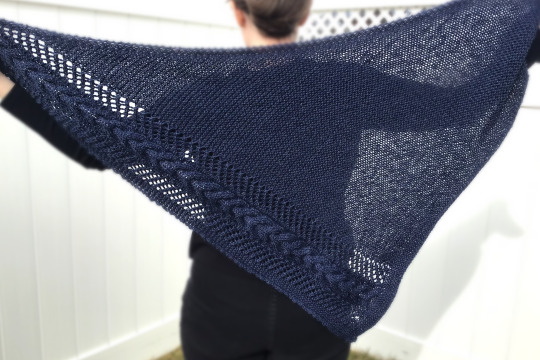
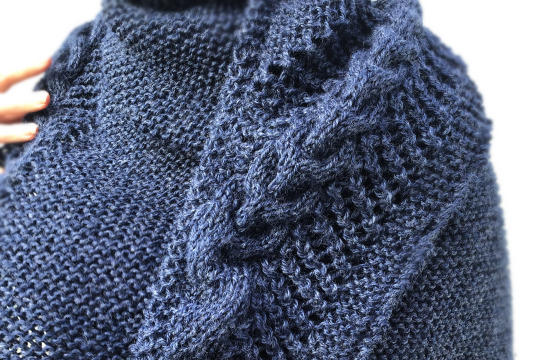
Chains and Lattice Shawl - Over on Etsy!
DESIGN: Cable knit shawl or wrap, featuring a pattern of lacey lattice and a band of interlocking chain-like cables. The garter stitch body of the shawl is light and fluffy soft! ABOUT: **This is a one-of-a-kind item!** This scarf is made with light weight, recycled soft acrylic yarn, and can be hand-washed and dried flat or on a line.
#shawl#navy blue#chain#heavy#knitted#cable knit#hand made#one of a kind#small business#etsy#fashion#wrap#scarf#winter#autumn
39 notes
·
View notes